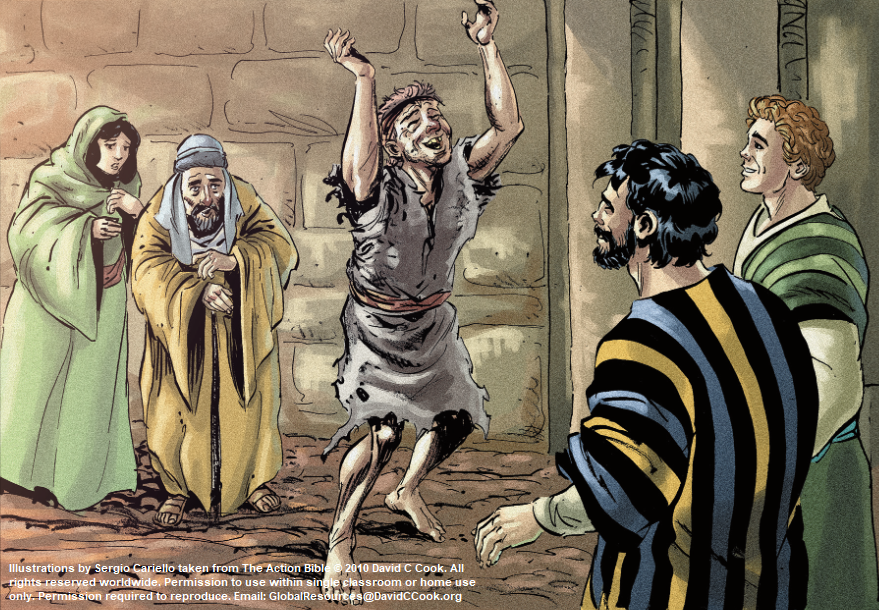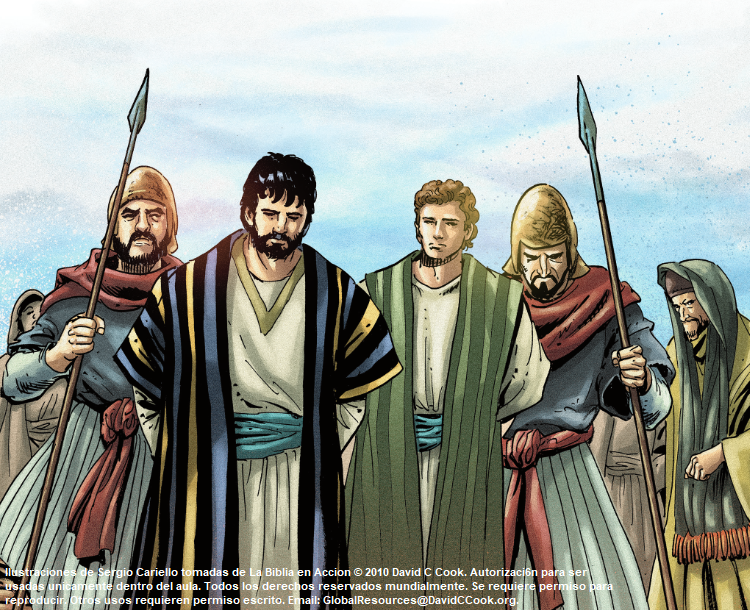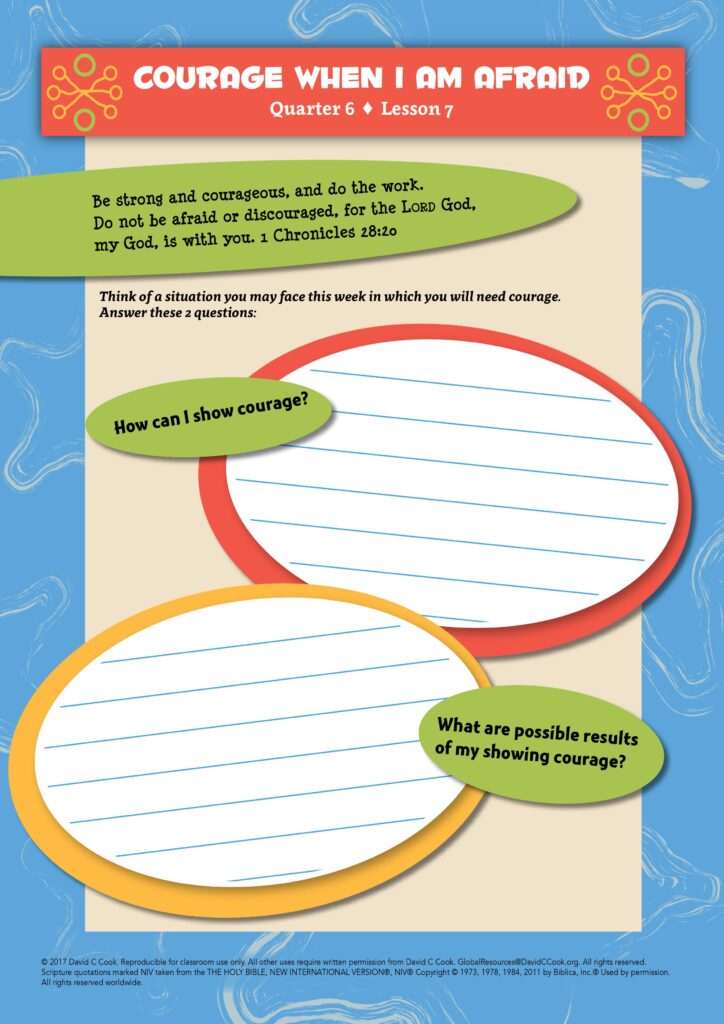During the lesson, the information for you to know is written in regular type, and what we suggest speaking or reading aloud to children is in bold. All resources for this lesson, including the Teacher Guide, Student Page, Family Connection Card, and other resources can be downloaded in a ZIP file by clicking on the following link:
In some lessons you will find "resource articles." These are articles written by experts from around the world to help equip you for your work with children and adolescents. Share them with parents or guardians if you consider it appropriate.
When [the religious leaders] saw the courage of Peter and John and realized that they were unschooled, ordinary men, they were astonished and they took note that these men had been with Jesus.
Acts 4:13
Unschooled, ordinary men. Yet the courage and wisdom Peter and John demonstrated before the religious leaders astonished them. The last phrase of this verse explains why: they had been with Jesus. Something about spending time with Jesus, being in His presence, caused Peter and John to speak and act in ways that amazed the people around them.
How often do you need courage or wisdom or peace in your life? Where do you go when facing a difficult situation, one that may even put you in harm’s way? Spend time with Jesus. As you take time to read His Word, pray, worship, and listen, you will be filled with all that you need for the day ahead of you.
Encourage families to talk about what to do when faced with situations where they need courage. They might ask their children what they need courage for this week? Then the families can ask God to help their children.
Teacher Tip: If possible, email or text the Family Connection Card to the families of your students.
Greet the children warmly as they come to class today. Let them know that today you will talk about courage again. Pick a child to review the story of the 3 young men who were thrown into the fiery furnace because they had the courage to refuse to worship the king’s golden statue. Have other children fill in details that were missed. This review should only take about 2 minutes.
Turn to your neighbour and answer this question:
The situation in the story had very real danger. In this instance God rescued the men. We may not face being thrown into a fiery furnace, but we do face other dangers—the loss of a family member, hunger or health problems, or even a bully who threatens us. Today we will learn about having courage in the face of real danger. When we need courage, we need to figure out how to go forward. Let’s watch a demonstration of what that may feel like.
Pick a volunteer and send her out of the class. While she is gone, set up a simple obstacle course—use chairs, a table to crawl under, a basin of water, rocks, and other things. Pick another child to be the guide. Blindfold the volunteer or have her keep her eyes closed, and bring her back to the class.
Explain that the guide will give directions to guide the blindfolded volunteer through the obstacle course. The guide cannot touch the blindfolded volunteer. As the volunteer goes through the obstacle course, the guide will call out things such as, “Watch out. There are steep cliffs.” “You have to get down low or you will hit your head on the rocks.” “Watch out for the snake.” After the volunteer has moved through the obstacle course, tell her to take off the blindfold or open her eyes. Ask these questions:
If the children do not mention it, point out that we often do not know where God will take us or what will happen next in our lives.
Sometimes we need courage to face dangerous situations. Remember, courage does not mean having no fear but believing that God will give you strength to do the right thing even when you are afraid.
Listen to these 2 stories. We will talk about them after I tell you both.
The first story is from the Bible. This true story happened after Jesus had died and rose again.
Optional: If possible, share the images from The Action Bible. If you are using The Action Bible, have the children read the story on pages 659–663.

One day, 2 of Jesus’ followers, Peter and John, were going to the temple to pray. They passed a man who was unable to walk, begging beside one of the temple gates. Peter and John did not have money to give the man. They had something even better! Listen to what Peter said to the man:
Then Peter said, “Silver or gold I do not have, but what I have I give you. In the name of Jesus Christ of Nazareth, walk.”
Acts 3:6
The man jumped to his feet and began to walk! Everyone was amazed. When the crowd wanted to know what had happened, Peter told them all about the mighty power of Jesus. He told them how to turn from their sins and become part of God’s family.
Well, the religious leaders did not like Peter and John talking about Jesus. These leaders were the ones who had created pressure to have Jesus killed on the cross. Now Jesus’ followers were continuing to talk to people about Him! The religious leaders grabbed Peter and John and threw them into jail.

The next day the religious leaders questioned Peter and John. Many leaders asked them questions about what power they had used to heal the lame man. They knew that Peter and John were just ordinary men and not well educated. But the leaders were amazed at their answers. Listen to what the Bible says about the leaders’ reaction.
If you are using the Memory Verse Poster, show it to the students.
When they saw the courage of Peter and John and realized that they were unschooled, ordinary men, they were astonished and they took note that these men had been with Jesus.
Acts 4:13

Even though the religious leaders commanded Peter and John to stop talking about Jesus, they refused. They told the leaders to decide if it was better to obey God or man. Then they told the leaders that they could do not stop speaking about Jesus. What courage!
Now I will tell you a story about some other men who were telling people about Jesus. These men were missionaries. A missionary is someone who goes to tell others about Jesus.
Many years after Bible times, 5 young American men went as missionaries to a tribe in the South American country of Ecuador. These young men believed that God wanted them to tell the Huaorani tribe about Jesus. The people of this tribe had never seen anyone from another country. They were very fierce people. All the neighbouring tribes were afraid of them.
The missionaries made careful plans for how they could safely reach out to the Huaorani tribe. The missionaries knew that before they shared about Jesus, the tribe would have to trust them. The missionaries began to build trust by flying over the Huaorani camp and dropping gifts. They called out friendly greetings over the radio loudspeaker. They did this every week for 3 months. They prayed that God would help them do this difficult job. The missionaries decided it was finally safe to land and make contact.
The missionaries decided to carry guns because they heard the tribe would not hurt them if they saw the guns. But the men agreed that they would not shoot the guns even to save their own lives. They believed God could save them if He wanted to. But the Huaorani thought the missionaries had come to hurt them, so they attacked and killed them.
Christians around the world mourned the deaths of these missionaries. Within weeks of the attack, more than 1,000 Christians volunteered to go back into the jungle to tell these dangerous people about Jesus.
Eventually the Huaorani people understood that the outsiders were not going to harm them. They realized that the outsiders were there to tell them the good news about Jesus. They eventually accepted Jesus as the One True God. After the young missionaries died, many in the Huaorani tribe became Christians.
Turn to your neighbour and discuss the following questions:
This last question is a difficult one that even adults have trouble answering. God sees everything that will happen—the beginning, the middle, and the ending. Sometimes there is a good ending, like we see with Peter and John, and sometimes we may face hard things. God knew the Huaorani tribe needed to hear about Him and the love of Jesus. So He asked the 5 young missionaries to go tell them. It was dangerous, and they were afraid, but they had courage to obey God. God can give us courage no matter what we face.
Read the following situations to your children and talk about what the child could do to show courage, and what the results might be.
Situation 1
Situation 2
Everyone get with a partner. Think of a situation you may face in the next few weeks in which you would need courage. For example, you might need courage to tell the truth or speak in front of the class for a presentation. Tell each other the situation. Then answer these 2 questions: “How can I show courage?” and “What might the results be of my showing courage?”
Optional: If you are using the Student Pages, have the children answer these questions on their pages.

Give the children about 2–3 minutes to talk together. Encourage them to pray for their partners. Close by speaking this blessing based on 1 Chronicles 28:20 over the children.
Blessing: May God Himself cause you to be strong and courageous. May He help you to act and not be afraid, for He is with you. He will not fail you or forsake you.
Lead the children in singing this quarter’s song, if possible.
Life on Life ©2020 David C Cook. Reproducible for home or classroom use only. All other uses require written permission from David C Cook [email protected]. All rights reserved.